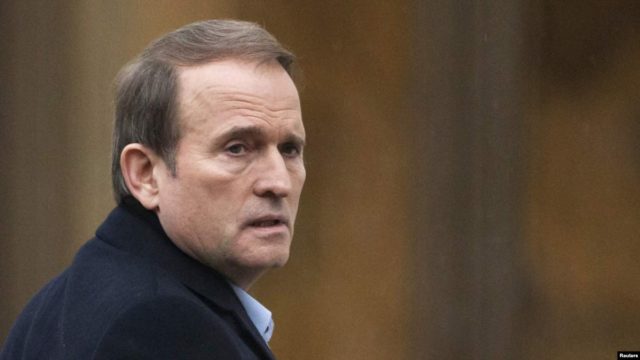
Ukraine’s President Zelenskyy Turns Blind Eye to Putin-Medvedchuk Scheming (Part One)
Publication: Eurasia Daily Monitor Volume: 17 Issue: 36
By:

On March 10, in Moscow, Ukraine’s leading Russophile politician Viktor Medvedchuk conferred with Russian President Vladimir Putin and Duma leaders about adding an “inter-parliamentary dimension” to the Normandy forum (Russia, Germany, France, Ukraine), which is an inter-governmental process. The idea, credited to Medvedchuk, is to enlist inter-parliamentary support for decisions in the Normandy and Minsk processes on special status and elections in Ukraine’s Russian-controlled Donbas. Those decisions would then be handed down to the Verkhovna Rada (Ukrainian parliament) for legislative enactments. Putin gave Medvedchuk this opportunity to bypass Ukraine’s state leadership and publicly coordinate his initiative with the Kremlin. The reaction from Ukraine’s presidential team is equivocal and supine.
On March 11, in Minsk, the Russian and Ukrainian presidents’ representatives, Dmitry Kozak and Andriy Yermak, respectively, agreed to create a new negotiating platform as part of the Minsk negotiating process. The new platform, as proposed, would cast the Ukrainian side and Russia’s proxies in Donetsk-Luhansk as coequal parties to an intra-Ukrainian conflict, while casting Russia as an impartial observer (Dzerkalo Tyzhnia, March 12).
These interrelated moves reflect preparations on both sides for a possibly decisive phase in the Normandy and Minsk processes. Ukrainian President Volodymyr Zelenskyy’s team hopes to hold local elections in the Russian-controlled Donbas by October, as part of Ukraine’s country-wide local elections. Leveraging Kyiv’s impatience against it, the Kremlin has responded with Kozak’s and Medvedchuk’s proposals. Zelenskyy’s team has preliminarily accepted Kozak’s but seems mum to Medvedchuk’s.
Medvedchuk headed a delegation of six parliamentary deputies from his party (Opposition Platform–For Life) to the talks in Moscow, on the same day when the Russian Duma was voting to approve the extension of Putin’s presidential tenure. Medvedchuk had visited Putin in Russia many times personally, but the March 10 visit was the first by a Ukrainian parliamentary delegation in the six years since the start of Russia’s military intervention in Ukraine. The Duma’s plenary session gave this delegation a standing ovation.
Meeting with Putin separately, Medvedchuk presented an enlarged version of a concept he had aired in the wake of Ukraine’s July 2019 parliamentary elections (see EDM, August 5, 2019). Putin blessed it and encouraged Medvedchuk to proceed with it in Ukraine and Europe (TASS, Kremlin.ru, March 10, 11; 112.ua, March 12, 13).
Medvedchuk insists, as does Putin, that the Ukrainian parliament must incorporate the political clauses of the Minsk “accords” into Ukraine’s legislation, to wit: constitutional amendments on decentralization, special status for Donetsk-Luhansk, general amnesty for those involved in “the events” (war-related crimes) there, a special law on local “elections” in the occupied territories, as well as authorizing negotiations between Kyiv and Donetsk-Luhansk toward those goals. The Ukrainian parliament, therefore, needs the “support of our colleagues from Russia’s Duma and the French and German parliaments, persuading our Ukrainian parliamentary deputies that the Minsk accords have no alternative and must be implemented in full through Ukrainian legislation, so as to bring Ukraine closer to peace.”
That would be the agenda of the inter-parliamentary forum, to be designated as the “Normandy parliamentary dimension” (Medvedchuk credits Putin with the paternity of this title). Medvedchuk asked Putin to intercede with German Chancellor Angela Merkel and French President Emmanuel Macron, who could encourage members of their countries’ respective legislatures to join the proposed Normandy inter-parliamentary forum. Putin agreed to intercede, but also used the opportunity to shift the onus to Zelenskyy: “I hope that this project becomes successful with the support of Ukraine’s president.”
The Duma’s chairperson, Vyacheslav Volodin, meanwhile, suggests launching a bilateral Russian-Ukrainian inter-parliamentary dialogue, before the quadripartite forum would materialize. Volodin proposes this bilateral dialogue at the level of parliamentary committees whose competencies are relevant to Ukraine’s enactment of the Minsk “accords” into Ukrainian legislation. According to Volodin, a bilateral working group has been set up during this visit (presumably with members of Medvedchuk’s delegation). Medvedchuk hopes for the inaugural Normandy parliamentary meeting to be held in conjunction with the next summit of the four heads of state and government, tentatively scheduled for April in Berlin.
The Ukrainian leadership seems to protect Medvedchuk from public opprobrium and suspicions of disloyalty. Presidential Office head Andriy Yermak, Rada chair Dmytro Razumkov and parliamentary majority leader David Akharamia all suggest that there is no case for legal or parliamentary action. They argue that Medvedchuk merely expressed his own opinion and that of his party in Moscow, did not carry any official instructions anyway, and his delegation did not apply to the Ukrainian parliament to cover the costs of its Moscow visit (UNIAN, March 13; Ukrinform, March 11, 14).
The proposed inter-parliamentary forum is designed to: 1) increase the pressure on Ukraine, counting on selected German and French parliamentarians to support a political settlement on Russian terms; 2) push for those political terms’ implementation without addressing the security issues (troop withdrawal/disarmament/demobilization, border control), all of which are omitted from the proposal’s public presentation; 3) accelerate and advance the settlement process from the international diplomatic field into the Ukrainian legislative field—a major breakthrough that could push Ukraine closer to a potentially fatal outcome; 4) render Medvedchuk’s pro-Kremlin party acceptable on the international level; and make this party a potential stakeholder in a Ukrainian coalition government that would guarantee this settlement’s implementation.
It seems highly unlikely for Medvedchuk and the Kremlin to be able to enlist any but marginal European parliamentarians into this project.



